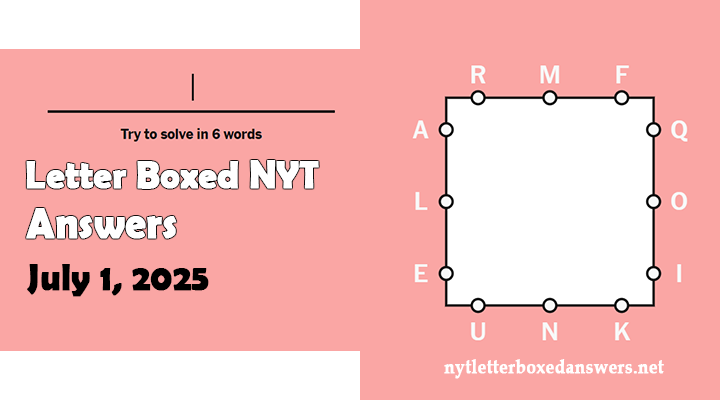NYT Letter Boxed quiz for Tuesday July 1, 2025 is released. We came up with Letter Boxed July 1 2025 Answers and Hints for you. With the help of these hints, you will be able to guess the words of letter boxed quiz without revealing the answers and get the solution.
| Top | Right | Bottom | Left |
|---|---|---|---|
| RMF | QOI | UNK | ALE |
| Two Words Solution | ||
|---|---|---|
| EQUILIRIA | AFIKOMEN | |
| FANMAKER | RONQUIL | |
| FLORIKEN | NAMAQUA | |
| FOAMLIKE | ENQUIRE | |
| Three Words Solution | ||
|---|---|---|
| AIRIER | REQUIEM | MENFOLK |
| AIRLINER | REQUIEM | MENFOLK |

Word 01:
This 9-letter word starts with E and ends with A; likely a coined or poetic variant of “equilibria,” meaning states of balance.
Resembles plural of “equilibrium.”
Suggests multiple moments of stability.
Could be used in philosophical or poetic contexts.
Not standard, but morphologically intuitive.
Might appear in metaphysical writing.
Related to symmetry and mental calm.
Could describe competing balanced forces.
May symbolize inner harmony or cosmic balance.
Ideal word for abstract writing or fantasy naming.
Word 02:
This 8-letter word starts with A and ends with N; a piece of matzo hidden during Passover.
Important part of the Seder meal tradition.
Children often search for it during Passover.
Comes from Greek aphekomen — “I have come.”
Symbolizes the Paschal Lamb or redemption.
Hidden and retrieved near end of the meal.
Associated with fun and spiritual meaning.
Often traded for a prize.
Reflects themes of deliverance and memory.
Integral to Jewish tradition and family ritual.
Word 01:
This 8-letter word starts with F and ends with R; someone who crafts handheld fans.
Once a respected artisan trade.
Common in 18th-century fashion.
May use lace, feathers, or paper.
Combines function and aesthetic.
Often catered to aristocrats or royalty.
Associated with elegance and formality.
Can also be a term in niche crafts today.
Historically part of luxury trade guilds.
In modern usage, may be metaphorical or niche.
Word 02:
This 7-letter word starts with R and ends with L; a small North Pacific fish of rocky areas.
Found in marine biology or ichthyology texts.
Lives in shallow coastal environments.
Sometimes confused with sculpins.
Adapted to crevices and rocky bottoms.
Not widely known outside scientific circles.
Typically bottom-dwellers with slender bodies.
Example of niche marine biodiversity.
Rarely used outside academic or ecological writing.
Not commercially important, but ecologically notable.
Word 01:
This 8-letter word starts with F and ends with N; an alternative name for a type of bustard bird found in India.
Also known as Bengal florican.
Critically endangered species.
Found in tall grassland habitats.
Subject of conservation efforts.
Males perform elaborate mating displays.
Resembles other bustards in size and shape.
Hunted for meat and habitat loss.
Cited in Indian wildlife reports.
Key indicator species for healthy ecosystems.
Word 02:
This 7-letter word starts with N and ends with A; refers to a region and people in southern Africa.
Also the name of a dove and chameleon species.
Rich in desert flora and fauna.
Famous for stunning springtime wildflowers.
Related to the Khoisan people.
Located in parts of Namibia and South Africa.
Holds historical and ecological importance.
Often used in biological species names.
Culturally significant and linguistically distinct.
Term appears in both human and natural sciences.
Word 01:
This 8-letter word starts with F and ends with E; resembling or having the texture of foam.
May describe spongy or bubbly material.
Seen in bath products, seaspray, or desserts.
Can also be metaphorical (e.g. light or insubstantial).
Often used in chemistry or cooking.
Evokes softness, froth, or airiness.
Useful in describing textures in cosmetics.
Applies to lightweight plastic or rubber.
Found in environmental descriptions too.
Blends tactile and visual imagery.
Word 02:
This 7-letter word starts with E and ends with E; British spelling of “inquire,” meaning to ask or investigate.
Used commonly in formal or written English.
Seen in signs: “Please enquire at desk.”
Associated with customer service or academia.
Synonym of “ask,” “question,” “probe.”
Can involve curiosity or formal request.
Often followed by “about” or “into.”
Appears in legal and journalistic language.
Not interchangeable with “require.”
Comes from Latin quaerere — “to seek.”
Word 01:
This 6-letter word starts with A and ends with R; comparative of “airy,” meaning more light or spacious.
Describes rooms with better ventilation.
Suggests openness and freshness.
Could refer to a lightweight tone or idea.
Opposite of cramped or stuffy.
Can describe speech that’s insubstantial.
Related to space, air, or lightness.
May be used positively or negatively.
Common in interior design or poetry.
Derives from “air” with a comparative suffix.
Word 02:
This 7-letter word starts with R and ends with M; a mass or composition for the dead.
Often written in honor of someone deceased.
Mozart and Verdi composed famous ones.
Can be orchestral, choral, or liturgical.
Associated with mourning and reflection.
Also means remembrance or solemn tribute.
Latin origin meaning “rest.”
Common in religious and classical music.
Symbol of final peace or transition.
Frequently performed at funerals.
Word 03:
This 7-letter word starts with M and ends with K; collective term for male family members.
Opposite of “womenfolk.”
Often used in rural or old-fashioned contexts.
Refers to male relatives or male group.
Seen in historical or folklore settings.
Suggests traditional gender divisions.
Common in storytelling and old dialects.
Used to describe household composition.
Similar usage as “kin” or “tribe.”
Less common in modern speech.
Word 01:
This 8-letter word starts with A and ends with R; refers to a large aircraft used for transporting passengers.
Commonly operated by commercial aviation companies.
Flies fixed routes between cities and countries.
Examples include the Boeing 747 and Airbus A380.
Designed for long-distance travel and high capacity.
Often seen at airports, taxiing, taking off, or landing.
Central to global transportation and tourism.
Cabin typically includes economy and first-class seating.
Heavily regulated for safety and international standards.
Modern versions equipped with jet engines and GPS.
Word 02:
This 7-letter word starts with R and ends with M; a mass or composition for the dead.
Often written in honor of someone deceased.
Mozart and Verdi composed famous ones.
Can be orchestral, choral, or liturgical.
Associated with mourning and reflection.
Also means remembrance or solemn tribute.
Latin origin meaning “rest.”
Common in religious and classical music.
Symbol of final peace or transition.
Frequently performed at funerals.
Word 03:
This 7-letter word starts with M and ends with K; collective term for male family members.
Opposite of “womenfolk.”
Often used in rural or old-fashioned contexts.
Refers to male relatives or male group.
Seen in historical or folklore settings.
Suggests traditional gender divisions.
Common in storytelling and old dialects.
Used to describe household composition.
Similar usage as “kin” or “tribe.”
Less common in modern speech.

Chris Brown is a passionate word game love and problem solving expert. With over 15 years of experience in solving puzzle challenges, he provides daily NYT Letter Boxed answers, tips and strategies to help other players so that they can improve their solving skills. Whether you are stuck on a tricky puzzle or looking for new techniques, Chris is here to guide you with his expert solutions.